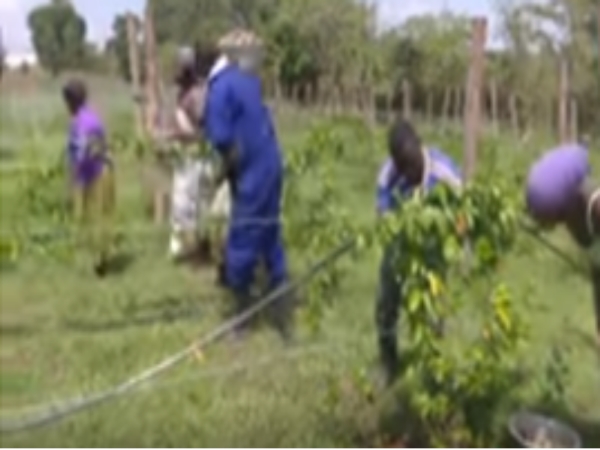Sam Amanyire of Lubalika village in Lwemi Sub-county in Kabarole district has been a passion fruit farmer and trading the same for five years now. He started out with 8 acres in 2012 with a Ugandan variety called UPF 12. He later planted KPA 4, a variety from Kenya which he said was not resistant to drought and diseases. “It is friendly to the pocket, you spray the fungicide, you can skip a week or two before you can spray another.” In the last one year, pests and diseases as well as the long drought spell have affected his production. “We thought the April-May rainy season would benefit us but we just got rain for one week, that was the beginning of May and actually that’s the time we planted our lower garden. Like this plant, this particular plant has been affected by the fusarium wilt.”
The most common is fusarium wilt disease which has led to ruining of his garden. The fungus affects the plant through the roots and then travels up to the plant’s stem, it dries up the plant after ruining the leaves and this could end up killing the plant. “When you uproot it, it has been eaten from down and it withers all of it withers. Currently, it has no known cure” Said amanyire.
Amanyire tried to control the disease by removing the affected plant from the garden but in vain. “We should not; it should not come into unnecessary contact with the rest of the plants so that in the course it does not affect the safe plants.” The dry spell which saw Kabarole go without adequate rainfall for one year and a half left Amanyire almost helpless. But he had not lost hope because he invested in irrigation to maintain productivity. “I didn’t know this dry spell would stretch up to now, so probably now it is eating into my pocket, I have to irrigate daily like we are going to see down there and when we do irrigate, that is an added cost, more labor, fuel that pumps the water and all that.”
Other farmers in Kabarole facing the same problems sought measures to control pests and diseases. Erica Kadulu also a farmer in the area has employed an agronomist to help him tackle such challenges on his farm. “You need to make sure you are buying your chemicals and your insecticides, fungicides from a reputable dealer. don’t just go to any guy who is selling whatever you want because a lot of fake products are on the market especially in Uganda which is not regulated as other agricultural countries.” During grafting and harvesting, the scissor is dipped in jik detergent before it used on another plant. “So, the reason why am putting jik here is to disinfect tools like scissors, grafting knives. they can also wash their hands with it. when they are harvesting, you find some vines need to be pruned so they will have to use jik so that you don’t spread. If there are pathogens, you would not spread from one plant to another.” This helped to prevent the like of fusarium wilt disease and others. Other disease control measures included not planting where fusarium disease wilt had been detected until after three years. Good fruit hygiene is also a key especially by uprooting affected plants and burning them. Passion fruit farmers are crying out for expensive drugs in the market which could help the fight such diseases. “There’s a fungicide which is effective called Darkonil. Darkonil, a 25-litre jerrycan costs 1.3 million shillings from Uganda Crop Care, Bugolobi. Now, how many farmers can afford that fungicide of 1.3?” They asked the government not to tax such drugs. “If the government would look at it this way as a way of trying to promote us farmers and it scraps off all taxes from fungicides, from farm inputs, all farm inputs; let them be insecticides, fungicides, parricides and all that. It would be helping people go into farming.” Said Amanyire.

